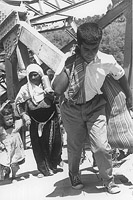One of the loudest debates in Israel surrounding the Gaza disengagement plan, which is scheduled for August, is whether or not to destroy settler homes, farms and greenhouses. Many of those who reluctantly say they support and will comply with the withdrawal argue in favor of razing the settlements on the grounds that they do not want to see Palestinian flags raised over their roofs or Palestinian families living in their homes. Also, the media is filled with heartening, sympathetic stories of how the settlers must, by force, uproot their families, abandon their homes and leave their towns after decades of living there. What an outrageous offense against these settlers! But stop for a moment … what about the tragic displacement of 700,000 Palestinians 57 years ago at the hands of these settlers and their forbears?
On May 15 Palestinians all over the world will commemorate the 57th Anniversary of Al-Nakba, or “Catastrophe” in Arabic. In 1948 the Zionist campaign burst into full force in an effort to settle Palestine with Jews. Thus, the state of Israel was established, resulting in the mass displacement of an indigenous population. More than 700,000 Palestinians were forced from their homes, villages and towns; civilians were strategically massacred by Zionist armies; and more than 500 villages were razed to clear the way for Jewish settlers. The Palestinians, who had lived in this territory for centuries, were pushed toward the east or scattered throughout the world as refugees.
The world stood by and watched this tragedy take place. There was no compensation. Palestinians were left with only the bags they could carry, the memories and dream of their homeland, and the knowledge that foreigners are living in their homes and tending their lands. Israeli villages were built over Arab villages, changing the names as a way to wipe away the memory and history of the land. There is not a single place in Israel that did not have a former Arab population. The aftermath of Al-Nakba saw the formation of hundreds of refugee camps in the West Bank, Gaza, Jordan and Lebanon and many more in the Diaspora.
According to the United Nations Relief and Works Agency, there are 5.5 million registered Palestinian refugees in the world. However, Palestinians today continue to feel the effects of this catastrophe, including the hardships of daily life as a people with a nation, but no state. They continue to struggle, resiliently, for self-determination, freedom and basic human rights. Israel’s attempt to break the will of the Palestinians and cleanse the state of their presence – through massacres, discrimination, diasporization, Israeli national identity, brutal occupation, harassment and a counterfeit history – have failed miserably. Palestinians continue to hold firm to their connection to the land and hope for peace. Today, Al-Nakba is very much alive and relevant.
In response to the events of 1948, the UN passed resolution 194, stating that “the refugees wishing to return to their homes and live at peace with their neighbors should be permitted to do so at the earliest practical date, and that compensation should be paid for the property of those choosing not to return and for loss of or damage to property which, under principles of international law or in equity, should be made good by the Governments or authorities responsible.” It also instructs the Conciliation Commission “to facilitate the repatriation, resettlement and economic and social rehabilitation of the refugees and the payment of compensation.”
Like almost every other international law and agreement, Israel has failed to comply. However, it has been able to draw biased sympathy for the illegal settlers and settlements, who are receiving compensation for their evacuation from Gaza.
This day is not only a time to remember the tragedy and subsequent suffering of the Palestinians during Al-Nakba; it is also a time to test the international community’s true commitment to freedom, justice and equality for all people. Once again, it is time for a true, peaceful end to the conflict.



























